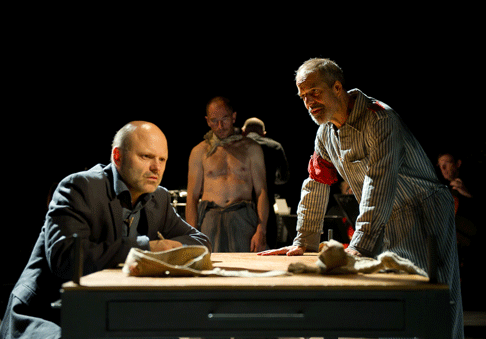20 Sep 2010
An experience In the Penal Colony
Kafka's In the Penal Colony set as an opera by Philip Glass? Against all expectations, it was a powerful and deeply moving experience.

Kafka's In the Penal Colony set as an opera by Philip Glass? Against all expectations, it was a powerful and deeply moving experience.
A Visitor (Michael Bennett) arrives in a remote penal colony. He’s asked to witness an execution. He tries to be completely neutral, insisting that his opinions don’t count because he’s not involved with the system. A Condemned Man (Gerald Tyler) is to be strapped into a machine which kills slowly by driving the words of his “crime” into his body. Thirty years ago I read Kafka’s original story. It’s so horrifying that I haven’t been able to read it since.
It’s so traumatic that you’re forced to respond. Kafka intuited Antonin Artaud’s theory that extremes shake people out of complacency. In the penal colony, people accept the killing machine passively, even though it’s no longer as well maintained as it was when the Old Commander, its inventor, ruled the island. No-one is prepared to take moral responsibility.
Only when the Visitor finally confronts the horror do things change. The Officer, however, has so absorbed the madness that he can’t live without it.
Glass’s music whirls, unearthly sounds projected over a string quintet, mechanical merging with live music, as precisely as cogs in a machine. The endless repetitions fit the plot as tightly as a straitjacket. “Efficient, quiet, anonymous”, as the Visitor explained he’d like to be. You’re half-hypnotized by this strange semi-trance music, just as the protagonists are numbed into accepting their circumstances.
Yet the repetitions move with a crazy logic, sometimes up a notch, sometimes disintegrating into cacophony (such as when the Officer thinks of his homeland — a last glimpse of the man he once was). Pay close attention to the subtle gradations. Like good film music they affect emotions subliminally. You understand how people in the penal colony become machines.
Omar Ebrahim, who sings The Officer, is extremely experienced in contemporary music theatre. His vocal range is prodigious, though not used here where the monotony of the music is part of the plot. Nonetheless, Ebrahim brings surprising lyricism to the part. Some passages shimmer with the fervour of Bach. The Officer’s dedication to his old Commander and to the machine demands total sacrifice. Blasphemy, perhaps, but in the insane world of the penal colony, there’s crazy logic to the idea that the Officer should offer himself to the machine as it falls apart.
The Music Theatre of Wales Ensemble played well. If at times, the electronic projections of Sound Intrermedia — leaders in their field — threatened to overwhelm, it reinforced the disturbing effect of machine overcoming human. Michael Rafferty conducted, Michael McCarthy directed.
The Condemned Man is so debased, the character is silent. Instead, Gerald Tyler moves like an animal, his eyes slanted, flickering like a snake. But for fortune, this dehumanized prisoner could be another Officer.
 Michael Bennett as the Visitor, Gerald Tyler as the Condemned Man and Omar Ebrahim as the Officer
Michael Bennett as the Visitor, Gerald Tyler as the Condemned Man and Omar Ebrahim as the Officer
Oddly both Tyler and Ebrahim are covered in tattoos which probably pre-date the production. It’s bizarre, since the machine carves words into bodies and the Old Commander’s penmanship was so elaborate the Visitor couldn’t decipher it. Michael Bennett didn’t undress. He disrobed emotionally.
In the Penal Colony isn’t meant to be entertaining. It’s subject is so sick that I can’t imagine what sort of people could sit comfortably through it. You’re forced to take an emotional stand. The Visitor looks at the audience, as if seeking guidance. The Condemned Man grabs the hands of those in the front row. Few will “enjoy” this opera, I guarantee, but it’s a powerful experience. Anyone who can emerge from these horrors unshaken one way or another must be shallow indeed.
Into the Penal Colony runs at the Linbury Studio Theatre at the Royal Opera House until 20th September then tours throughout the United Kingdom. Music Theatre Wales is courageous to put this on, because it is an important work. Much more condensed and focused than much of Glass’s other work, this piece will not easily be forgotten.
For more information please see the Music Theatre Wales site.
Anne Ozorio